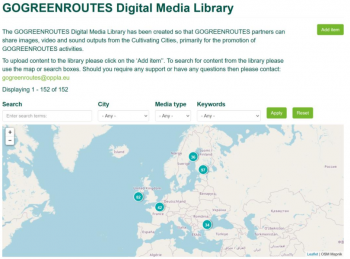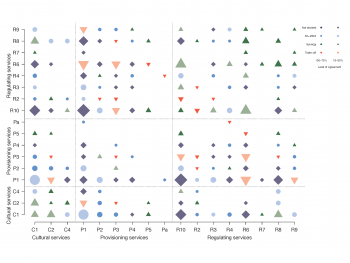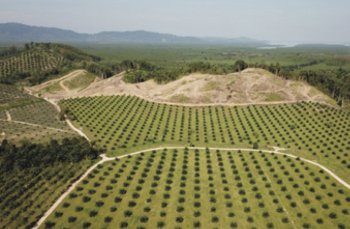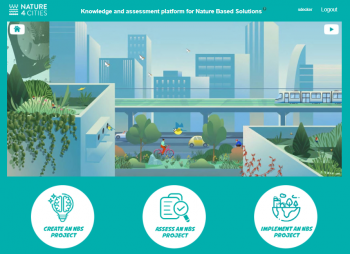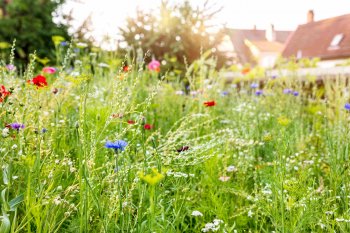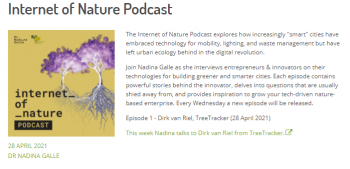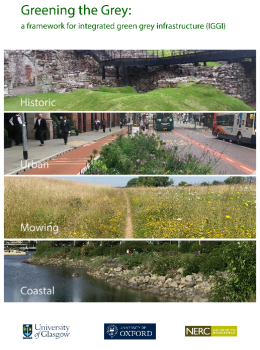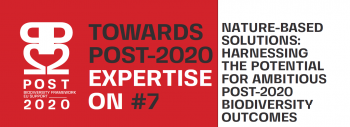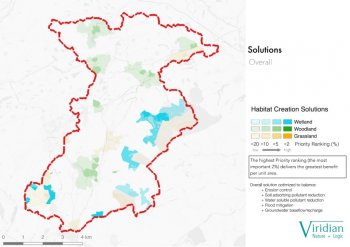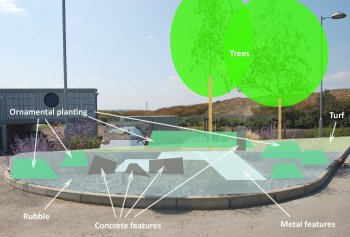Marketplace
Social innovation and temporary innovations systems (TIS): insights from nature-based solutions in Europe
The purpose of this paper is to examine the applicability of the complexity-based temporary innovation system (TIS) framework to social innovation and examine the extent to which “nature-based solution” (NbS) projects may be understood through a TIS lens. It is proposed that TIS provides a
- Video
PHUSICOS - Caídas de bloques en Artouste
The hazard at Artouste is caused by rockfalls, both from exposed rock ledges and from loose blocks sitting on the surface of the till on the steep slope. The site is adjacent to the Artouste hydroelectric dam, where the RD-934 road descends from the level of the dam to its base. The slope is steep
ALARM - Assessing large scale risks for biodiversity with tested methods
Based on a better understanding of terrestrial and freshwater biodiversity and ecosystem functioning ALARM will develop and test methods and protocols for the assessment of large-scale environmental risks in order to minimise negative direct and indirect human impacts.
Opinion Fact sheet: Bio-diverse cities and regions beyond 2020 at the UN CBD COP 15 and in the EU Biodiversity Strategy for 2030
The political objective of this own-initiative opinion is to adopt the official position of the CoR to disseminate in the ongoing preparatory meetings and events towards the 15th Conference of Parties of the United Nations Convention on Biological Diversity (UN CBD COP 15) and consequently to
Economic Viewpoints on Ecosystem Services
The concept of ecosystem services has been introduced to help determine the different values of ecosystems. This report provides an introduction to ecosystems and economics: it provides a useful introduction for scholars from other social sciences as well as for biologists/ecologists acting as
GoGreenRoutes digital media library
Oppla created a digital media library which holds images and videos reflecting each of the Cultivating Cities and the outputs and interventions of the GoGreenRoutes project. The database is available to the Cultivating Cities to use for promotion of GoGreenRoutes activities, particularly digital
Brief: Nature-based solutions for ecosystem restoration
This brief provides an overview of ecosystem restoration and the current policy frameworks behind ecosystem restoration efforts and the goals and targets set for improving degraded ecosystems and improving biodiversity.
A quantitative review of relationships between ecosystem services
These are the figures that are published in "A quantitative review of relationships between ecosystem services" in Ecological Indicators in 2016. In this publication, we analysed 67 case studies that studied 476 pairwise ES combinations. The relationships between these pairs of ES were
Conserving tropical biodiversity via market forces and spatial targeting
Successful conservation on private land depends on three factors: the conservation effectiveness for the target species; the private costs in reduced productivity; and the private benefits that conservation provides, for example, by enhancing the value of remaining production. Research on palm-
Nature4Cities platform
The main objective of Nature4Cities project is to increase the awareness about the Nature Based Solution (NbS) and to promote new collaborative models for NbS uptake. Following this purpose, the Nature4Cities (N4C) Platform has been developed including a set of tools with the aim of spread
Nature-based solutions in the GrowGreen cities: videos
As the evidence base on the role and benefits of nature-based solutions (NbS) grows rapidly, these solutions are featuring with increasing prominence in global climate change policy, stressing the importance of their implementation in urban environments. The Horizon2020 project GrowGreen has
Demonstrating the impact of innovative nature-based solutions
This Infographic shows the environmental, social and economic impact of innovative nature-based solutions in Connecting Nature cities Genk, Glasgow, and Poznań.
Internet of Nature Podcast
The Internet of Nature Podcast explores how increasingly "smart" cities have embraced technology for mobility, lighting, and waste management but have left urban ecology behind in the digital revolution. Join Nadina Galle as she interviews entrepreneurs & innovators on their
Science at ISGlobal
The 1000 cities ranking is a project of the Barcelona Institute for Global Health (ISGlobal), one of the centres in the PRBB. It’s aim is to estimate the impact of air quality, noise, temperature and proximity to green spaces on the health of people living in Europe's largest cities. Learn
Greening the Grey: A framework for integrated green grey infrastructure.
The University of Glasgow (with Oxford University and NERC) have created a Framework for green-grey infrastructure. The IGGI report includes16 detailed case studies and 30 vignette examples of costed, innovative real world exemplars where "green" habitat has been included in grey
NATURE-BASED SOLUTIONS: HARNESSING THE POTENTIAL FOR AMBITIOUS POST-2020 BIODIVERSITY OUTCOMES
Nature-based solutions offer the transformative, whole-of-society approach needed to achieve the protection, restoration, and sustainable use of biodiversity. The post-2020 Global Biodiversity Framework now has a unique opportunity to show the leadership required to ensure that nature-based
- Video
PHUSICOS: Unstable till slope at Santa Elena
The slope at Santa Elena has been pointed out as one of the high-risk locations along road A-136, which is an important route between Spain and France (road RD-934 in France). The problem is erosion and instability in a steep slope, cut in a thick till deposit. This is an end moraine formed by the
Viridian modelling of nature-based solutions
We use sophisticated modelling to identify, rank and prioritise Nature-based Solutions to multiple problems such as flooding, water resource supply, river pollution, soil loss, poor farm management and biodiversity loss. Our engaging communications show best bang for buck actions, with many
ECOMIMICRY (TURAS)
Innovative landscape design recommendations for maximising the biodiversity value of multi-functional urban green infrastructure (UGI) - designing with regional context
- ‹ previous
- 2 of 55
- next ›





